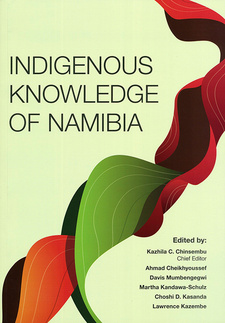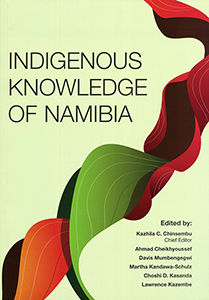Indigenous knowledge of Namibia, by Kazhila C. Chinsembu et al.

Indigenous knowledge of Namibia, by Kazhila C. Chinsembu et al. University of Namibia Press (UNAM Press). Windhoek, Namibia 2015. ISBN 9789991642055 / ISBN 978-99916-42-05-5
The editors of the book 'Indigenous knowledge of Namibia', Kazhila C. Chinsembu, Ahmad Cheikhyoussef, Davis Mumbengegwi, Martha Kandawa-Schulz, Choshi D. Kasanda and Lawrence Kazembe, are senior UNAM academics. Individual chapters are written by UNAM academics and post-graduate students from several disciplines in the natural and social sciences.
Introduction to Indigenous knowledge of Namibia
Nowadays indigenous knowledge has gained prominence and attracted public interest due to its numerous applications in science and innovation: biotechnology, health, bioprospecting, pharmaceuticals, medicinal plants, agriculture, food preparation, mathematics, natural resource management, climate change and astronomy. There are many niche players in the field of indigenous knowledge in Namibia and many studies being carried out. Thus, although not all aspects of Namibia's indigenous knowledge are covered in this book, most readers from various walks of life - laypersons, scholars and policy makers — will find this book a very useful companion. The content of this book serves as a good starting point, because 'we cannot go further into the future without looking deeper into the past' (anonymous). Through their laboratory and scientific studies, the authors of this book serve as guides through the journey to discover and record the indigenous knowledge of Namibian society. More importantly, their individual and collective works endeavour to add value to Namibia's indigenous knowledge. The voyage and value addition are aimed at bringing greater clarity to some of the most perplexing aspects of indigenous knowledge in Namibia. Authors are aware that local communities need to benefit from their indigenous knowledge. That being said, the aim of this book is not to appropriate the indigenous knowledge of local communities, as most indigenous knowledge is already in the public domain. Rather, in line with Namibia's National Programme on Research, Science, Technology and Innovation (NPRSTI), the aim of this book is to 'ensure that indigenous knowledge is properly documented' (NCRST, 2014, p.14). Many definitions and connotations of indigenous knowledge are provided in this book. However, it is important to note that indigenous knowledge is the foundation of Namibian society, an information base which facilitates communication and decision-making. It is dynamic, being continuously influenced by internal creativity, experimentation and external contacts. Moreover, indigenous knowledge is the cornerstone of many modern-day innovations in science and technology. It is also a ready and valuable resource for sustainable and resilient livelihoods. A brief historical background and context to this book is imperative. [...] Briefly, the book is arranged in 17 chapters. The first six chapters are devoted to the indigenous knowledge of medicinal plants for treating HIV/AIDS-related symptoms and diseases, malaria, cancer, and other microbial infections of humans and livestock. These are followed by chapters 7-10 which are assigned to indigenous foods, and chapters 11-13 that espouse the indigenous knowledge used to cope with human-wildlife conflicts and floods, as well as that which underpins the nexus of gender, climate change and management of natural resources. Chapter 14 unravels the indigenous knowledge of the Mafwe ethnic group. Chapter 15 speaks to the challenges of harmonising modern education with that of the indigenous San people of Namibia. Chapter 16 urges a new rationalization of adolescent customary and initiation ceremonies in response to the HIV/AIDS pandemic. Chapter 17 sums it all up, offering a compelling argument for "universities and other institutions of higher learning to rise to the occasion and integrate indigenous knowledge into existing or new degree programmes. [...]
This is an excerpt from the book: Indigenous knowledge of Namibia, by Kazhila C. Chinsembu et al.
Title: Indigenous knowledge of Namibia
Editors: Kazhila C. Chinsembu; Ahmad Cheikhyoussef; Davis Mumbengegwi; Martha Kandawa-Schulz; Choshi D. Kasanda; Lawrence Kazembe
Publisher: University of Namibia Press (UNAM Press)
Windhoek, Namibia 2015
ISBN 9789991642055 / ISBN 978-99916-42-05-5
Softcover, 17 x 24, 406 pages, several b/w photos and tables
Chinsembu, Kazhila C. und Cheikhyoussef, Ahmad und Mumbengegwi, Davis und Kandawa-Schulz, Martha und Kasanda, Choshi D. und Kazembe, Lawrence im Namibiana-Buchangebot
Indigenous knowledge of Namibia
Examines the indigenous knowledge of medicinal plants in Namibia, indigenous foods, coping and response strategies in dealing with human-wildlife conflicts, floods, gender, climate change and the management of natural resources.

